World Capital of Patent Law
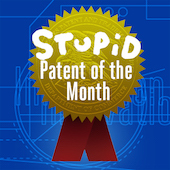 Once a month, the Electronic Frontier Foundation ( EFF ) announces the next winner in the “Dumbest Patent of the Month” nomination . In August, this proud title rightfully went to the Rothschild Connected Devices Innovations patent troll. In 2006, RCDI received a patent for the concept of a mixer, somehow controlled via the Internet, and in 2014 managed to extend the patent to remote control over the Internet in general .
Once a month, the Electronic Frontier Foundation ( EFF ) announces the next winner in the “Dumbest Patent of the Month” nomination . In August, this proud title rightfully went to the Rothschild Connected Devices Innovations patent troll. In 2006, RCDI received a patent for the concept of a mixer, somehow controlled via the Internet, and in 2014 managed to extend the patent to remote control over the Internet in general . On this basis, RCDI has already sued the manufacturer of equipment for smart homes ADT. In fact, the inventor of the (supposedly) smart crock-pot now claims to be licensed for everything that makes the Internet of Things today .
As you know, the delusional lawsuit was filed with the District Court of the Eastern District of Texas.
How? You do not understand? Then read on.
Uneven distribution
In total, there are 94 federal district courts in the United States of America . According to statistics, in the first half of 2015, 3,122 patent infringement cases were considered in the United States . A patent infringement is a crime within the federal jurisdiction , so the plaintiff has the right to file a lawsuit in any court of his choice.
It would be logical to assume that each district court examined for this period, tentatively, 3122/94 = 33 such cases. That is, about 3-4 dozen. You can also allow for the fact that most of these claims are probablyserved near Silicon Valley - that is, in one of the four county courts of the state of California, so there will be some advantage in the direction of California ships.
However, the reality is that out of 3,122 patent claims, 1,387, or 44.4%, were filed with the East Texas County District Court . There are no more accurate statistics, but there is every reason to believe that most cases were examined at the district court office in Marshall. Distribution of patent cases by district. EDTex - Eastern District of Texas
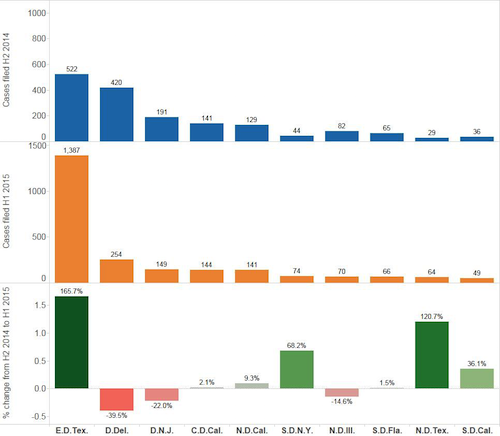
City from Stephen King's book
The fabulous Bob Gale movie Interstate 60 features the fictional city of Morlow, whose entire population consists of lawyers, lawyers, and judges who earn their living by litigation with random travelers. In 2002, the problem of patent trolling was not yet heard, so it must be admitted: Bob Gale was able to predict the future, albeit not far off.
The city of Marshall, Texas , is located 240 kilometers east of Dallas and 440 kilometers northeast of Austin, the state capital. The city's population is about 24 thousand people - not counting the hundreds of visiting lawyers and numerous offices of large and small patent trolls. In the 70s, 80s, 90s it was a fairly quiet, pastoral placefrom the category of those where tourists occasionally travel and from where young people prefer to leave in search of a more interesting life. It is difficult to speak for teenagers, but there was definitely nothing for tourists to do there: most of the sights (the opera building, the synagogue of Moses Montefiore, the old courthouse) were demolished or destroyed by 1990.
However, in the 21st century, Marshall was reborn from the ashes . A number of old houses (including the courthouse) were restored, the city center again began to live an active life. A certain role in this, of course, was played by the desire of the city authorities to attract tourists with colorful events, such as the Wonderland of Lights festival of light . But the main contribution to the Marshall renaissance rightfully belongs to one person -Federal Judge Thomas John Ward .
Episode I: The Phantom Menace
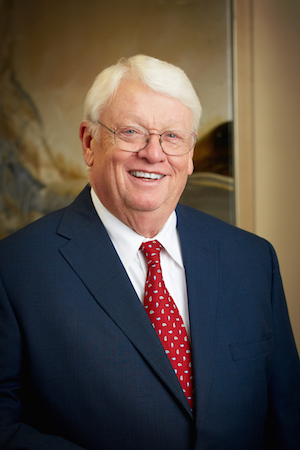
In the 90s of the last century, patent claims to the eastern district court of Texas were filed mainly by one company - Texas Instruments, a manufacturer of processors and semiconductor elements . The TI office was located in Dallas, but in the early 90s, the Dallas District Court was completely overwhelmed with drug smuggling cases , so Texas Instruments lawyers at some point took their next lawsuit to Marshall, and remained there. Unlike Dallas, the district judge’s office in Marshall wasn’t particularly busy, so it was quite convenient to handle matters there.
In March 1999, another lawsuitTexas Instruments was filed with the Korean company Hyundai Electronics. The Koreans hired local lawyers to defend themselves, one of whom was Thomas John Ward. On March 15, a court issued a verdict in favor of Texas Instruments, awarding the Koreans $ 25 million to pay. For Marshall, this amount was an absolute record, and this record held until 2006 , when TiVo sued $ 74 million from EchoStar .
After this incident, Ward became seriously interested in patent law . In later interviews, he notedthat he was attracted by the abstract nature of patent cases, requiring remarkable intelligence from all participants. According to Ward, the resolution of the most complex patent disputes requires, first of all, a strict schedule and the active interaction of the parties that defend their point of view in open debates. “Patents are the property of American citizens. People in this part of the world trust their government and consider it the duty of the government to protect their property . ”
In September 1999, a federal judge was replaced in Marshall. The venerable William Wayne Justice (known, among other things, for putting an end to racial segregation in Texas high schools) resigned, and Thomas John Ward was appointed in his place. First, Judge Ward “put things in order” in the procedure for considering patent infringement cases.
Rocket socket

The restored district court building in Marshall.
The US legal system has the concept of “summary judgment” (in Russian this can be roughly translated as “judicial decision based on the facts presented”): the defendant in the civil procedure may require the judge to issue a verdict at preliminary hearings, if he does not dispute the facts presented by the plaintiff and does not agree only with their legal assessment.
For example, a bank sues a resident of Voronezh for allegedly tricking the bank into signing an amended loan agreement . The Voronezh resident acknowledges the fact itself (he changed the text of the contract, sent it to the bank by letter), but believes that bank employees should carefully read what they sign. In this case, the judge at the preliminary hearings can decide on the basis of the facts presented - whether the Voronezh citizen had the right to make amendments to the mutually beneficial contract or whether the intentional misrepresentation of the bank was evident.
In essence, the decision boils down to an oral interpretation of the laws in relation to the facts that the plaintiff stated, but the defendant does not deny.
According to the federal rules of civil proceedings , the right of a defendant to recognize all facts at preliminary hearings and receive a summary judgment is inalienable. If the plaintiff makes several demands, it may happen that a summary judgment can be made on some of them, and the rest will be considered in court. But this does not make much sense, since the idea is to obtain a verdict entirely at the preliminary hearings , without lengthy and costly court hearings.
Judge Ward’s first innovation was that since 1999, Marshall patent claim defendants must ask the judge for permission before requesting a summary judgment , and their request may be rejected without explanation.
Needless to say, getting approval for such a request for a patent lawsuit in Marshall is extremely difficult ? But even in cases where the request is approved, the decision at preliminary hearings is made only in 18% of cases , while the national average for patent cases is 31% .
If a patent lawsuit was filed in your address in Marshall, TX, you have virtually no chance of avoiding an expensive lawsuit. Unless the patent troll-plaintiff for a certain amount goes to the world. What he, however, is seeking.
According to the lawyers of the Electronic Frontier Foundation , this attitude to the summary judgment is illegal, but it has not yet been possible to do anything with this procedure.
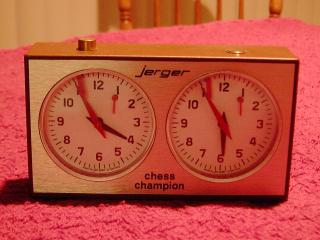
The second innovation of John Ward brought to life his wonderful idea of a tight schedule and active debate between the parties. Judge Ward brought a chess clock to the courthouse . Both the plaintiff and the defendant receive as much time as they judge on the clock. If the defendant’s arguments presented in the allotted time do not seem convincing to the judge, he usually makes a decision in favor of the plaintiff, because ( quoting Ward ) “if this paper is issued by the American Patent Office and it has such a big red-gold seal, it means something. ”
The court technique in Marshall was nicknamed "rocket docket" (from English.docket - a list of cases pending in court). Naturally, it is not always possible to present multipage arguments in 9-15 hours, which in other American courts takes up to a month of hearings , so Judge Ward also limited the maximum number of pages that could be submitted by each of the parties to the case.
Purely theoretically, the patent claim defendant has the right to file a petition for the adjournment of the hearings with the court located in the defendant’s district. I only mention this for pro forma, because such applications in Marshall, of course, are also simply not satisfied .
A similar litigation procedure could not fail to attract the attention of patent trolls . Figuresspeak for themselves : in 1999, Marshall examined 14 patent lawsuits, in 2002 - 32, in 2005 already 155, in 2006 - 234, in 2013 - 941 . For the first half of 2015, judges in East Texas examined 1,387 patent cases , which allows counting on overcoming the bar of 3,000 cases annually this year.
I must say that large corporations made certain conclusions from this situation. Marshall is a small town, everything is in sight, so it is reasonable to choose local lawyers and employees to consider the case on the merits. The New York Times gives an examplewhen one of the patent trolls lodging in Marshall hired an accountant to work out part-time accounts for the Ward family. By the way, among other lawyers in Marshall , the son of Judge Ward, Thomas John Jr., also practices .
David Callaghan, a consultant in Chicago, advises : “Marshall doesn’t have much formalities, so it’s best to hire a good local lawyer here.” Michael Smith, a lawyer from Marshall, claims that if a lawyer from East Texas is brought in, the probability of the defendant winning the court is close to 50%.
Samsung’s initiative can also serve as a good example: a South Korean giant sponsored a city ice rink a couple of years ago.which now bears the proud name of Samsung Ice Skating Rink. In a town for 25 thousand people! Really, one doesn't want to be unpopular in Marshall, TX.
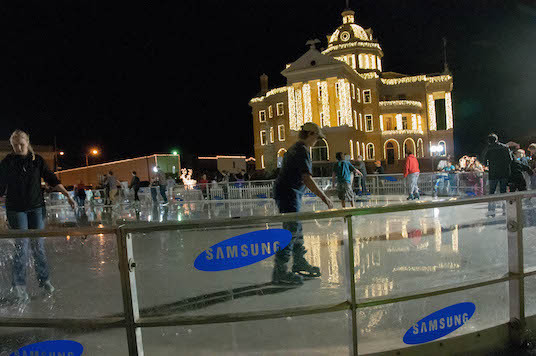
Episode IV: A New Hope?
Since 2011, Judge Ward Sr. has been retired, but his case lives on. Back in 2002, in the neighboring town of Tyler, Judge Leonard Davis decided to conduct patent cases on the model of Marshall . Since then, "rocket docket" has become the rule for the entire county.
Last year, the US Supreme Court in the Alice v. CLS Bank recognized the invalidity of patenting abstract ideas and algorithms in the form of instructions for execution on an abstract computer. Thanks to this decision, the percentage of patent claims won by defendants in the United States has grown markedly over this year . However, in the East Texas District Court, to refer to the precedent of Alice v. CLS Bank, now necessarysubmit a well-grounded petition in advance , which, of course, can be rejected (and yes, this is again illegal ).
Texas lawyers give a funny analogy . If you once bought a piece of bare, dry land, and 10 years later an oil fountain popped out of it, you have the right to receive income from this oil, right? So it is with abstract patents.
The draft Innovation Act of 2013, which passed the lower house of parliament in 2013 , was later rejected by the Senate , but will again be considered this year. Electronic Frontier Fund spreads callssupport patent law reform. But even if the reform is carried out, will Texas judges not get even bolder interpretations of the current legislation?
Well, I would like to know.
